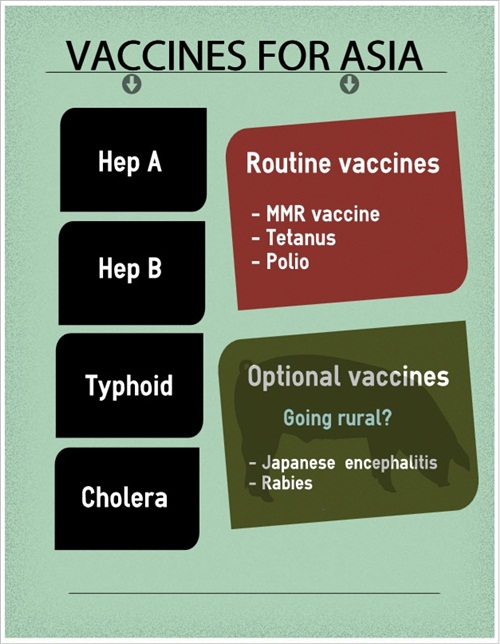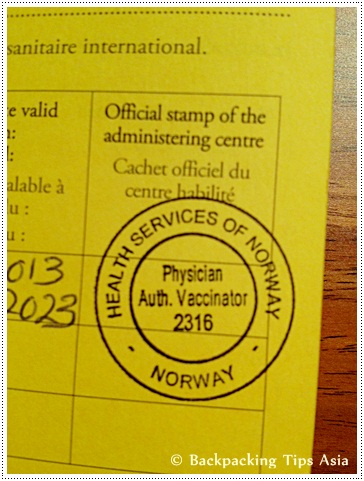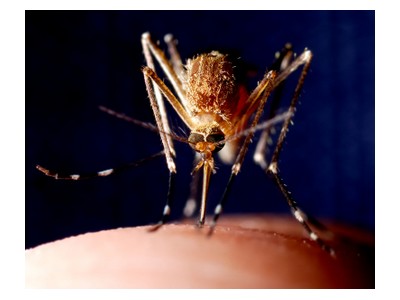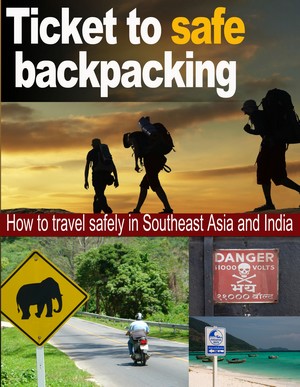Vaccines

"Vaccines" was last updated on April 27, 2012
All information below is subject to change
|
|
Which travel vaccinations you need depends on:
- Which countries you're visiting
- Where in that particular country you're traveling
- When you're traveling
- How primitive you're going to live in Asia
- How long it has been since you took your last shot
- Your medical history
Now, before you take those shots, ask yourself these questions:
- Which countries are you going to visit and where in the country are you heading? And when?
Quick links:
When should you take travel vaccinations?
What should the doctor/nurse inform you about?
I suggest you write down all the places you intend to visit (even though your itinerary is not ready)
- Do you want to spend most of your time in the cities/rural areas, or both?
- How long are you going to stay in rural areas?
- What kind of living conditions are you likely to have? (guest house, budget bungalow, tent etc.)
- Are you going to trek? For how long?
- Do you have any allergies or diseases you should mention to your doctor? Pregnant?
- Do you have any plans on working during the trip? (like volunteering with local children etc)
- Are you already on medication now? (in case you are, tell your doctor about this)
When should you
take travel vaccinations?
I'm not a doctor, so have that in mind when you're reading.
This article is strictly based on what I've experienced, heavy research and other backpackers' comments.
You should calculate enough time:
At least 4-8 weeks before departure, but this depends on what type of shots you've already taken.
If you want to save time, it's possible to take all the vaccinations in one day.
You should take vaccinations as early as possible because:
- First, it may take some time to book an appointment at your local travel clinic. But if you want to go to a doctor, and not a travel clinic, make sure the doctor specializes in travel medicine.
- The effects of some vaccinations should work effectively before you go, and not after.
Let's say you take your shots one week before departure and you're traveling straight to a rural village in Asia. This means that the effects will usually appear on your third week in Asia. That's a long time! Who knows what diseases you might have gotten during those weeks.
- Even if you don't manage to take your shots within 4-8 weeks, do it anyway! It's better to take vaccinations, than none at all!
- If you hate needles...
... and if you don't want to take all shots in one day, you have to allow some time between the vaccinations.
What should the doctor/nurse
inform you about?
- What vaccines you need
Have in mind that some clinics will try to sell you the whole vaccination package. You are not obligated to buy that package....!
I suggest that you research on the various vaccinations and talk to friends who have gone backpacking before. Ask them what they took.
Some will likely feel that they've wasted money on some vaccinations, like Japanese B, or even rabies. But it's up to you what you decide. There are no obvious answers... So research and feel it out.
Some backpackers take all 'necessary' vaccinations because they want to be on the safe side, and avoid worrying about it during travels.
- How much the shots cost
- The side effects of vaccines
- How long the vaccines will last
After you've been vaccinated, you'll usually receive a vaccination card/passport. This card will tell which vaccinations you have taken, the dates you took them, how much dose you were given and the place of vaccination. And don't forget the stamp!
Pearl from the forum: Bed Bugs in Thailand and Cambodia (opens in a new window)
What travel vaccinations
should you take?
The vaccinations mentioned below are specifically for Thailand, Laos,
Cambodia, Malaysia, Philippines and India.
Routine shots:
Check if you need to update your routine shots. Routine vaccines are the ones you took when you were a child:
- Polio (should take it every 10 years)
- Tetanus/Diphteria (should take it every 10 years)
Tetanus is caused by a germ that enters the body, either in a wound or a cut.
So, tetanus vaccine is a useful vaccine in case of accidents - like motorcycle- and moped accidents, climbing accidents or even when you snorkel and cut yourself on corals or sea urchins.
- MMR vaccine (measles, mumps)
- Tuberculosis (BCG vaccine)
If you've taken the BCG vaccine (probably at school), it's likely you have a round scar on your left or right upper arm. But if you want to be on the safe side, ask your doctor!
Here are the common travel vaccinations:

- Typhoid
Exposure to typhoid might occur through food and water.
- Hepatitis A
Hep A comes from infected food and water, and infected blood. The water in Asia is likely contaminated by sewage (like in India). And infected food might come from chefs with bad hand hygiene. So, watch out what you eat and drink.
Read my tips on food, water and hygiene.
You can also get Hep A from dirty needles, if that needle has been used by another person (before you). Like, in cases where you want to donate blood to the local community.
- Hepatitis B
You can get Hep B if you have unprotected sex (body fluids) or receive blood transmissions from a person with Hep B. So, to prevent Hep B, it's obvious that you should use condoms. And you might need a blood transmission, if you get involved in a dangerous accident.
- Cholera
Cholera is usually transmitted via (tap) water, and causes stomach pain, diarrhoea, vomiting and fever. You'll eventually get diarrhoea resembling rice water - thin and flaky.
An option is to drink the cholera vaccine (some has a berry flavour)... Yum! The brand I used was Dukoral.
You can also take vaccinations for:
- Japanese B encephalitis
Japanese B encephalitis is a disease transmitted by mosquitoes. And this type of mosquito lives around rice paddies and pigs. So, if you're planning on staying a long time in rural areas, you should take it.
The incubation period (Japanese B) is between 5-15 days. And the symptoms are fever, headache, nausea and vomiting.
You might need a rabies shot if you're planning to stay in rural areas in India. Many of the stray dogs in India and Thailand carry rabies.
If you don't want to take the vaccine, the best way is to avoid getting bitten by dogs and other animals, like monkeys and bats.
If you get bitten or scratched by an animal in Asia, you should clean it thoroughly. Then go to the nearest doctor so you can get a treatment.

- Yellow Fever
If you're coming from Africa/South America and traveling straight to, for instance Thailand, they want to reassure that you've taken the Yellow Fever vaccine. So, that means you have to show them a certificate which shows you have received this vaccination.
It's important that you get the stamp (see picture)!
If you're traveling to Thailand from South America or Africa, check out the website of Ministry of Foreign Affairs in Thailand.
To read more about the mentioned travel vaccinations, visit these links:
- Vaccines for Thailand
- ...For Laos
- ...For Cambodia
- ...For India
- ...For Malaysia
- ...For Hong Kong
- ...For South Korea
What about Malaria
and Dengue Fever?

I'm afraid there are no vaccinations for malaria and dengue fever. But there are some anti-malarial tablets you can take.
Which tablets you should take depends on which areas you're going to, your age, medical history etc.
Some brands have strong side-effects. So ask your doctor which tablets you should take. You'll also need a prescription for antimalarial drugs.
But have in mind that antimalarial tablets will not protect you a 100%. So you still have to avoid getting bitten, meaning that you should wear loose clothes and use anti-repellent actively.
I took Lariam (Mefloquine) when I traveled around in Asia. It's commonly known that Lariam tablets can cause sleeping disorders, headache, dizziness, nausea, anxiety and paranoia.
To be honest, the side-effects were bothering my sleep so I stopped taking them when I was in Thailand. There were some nights I couldn't sleep and other nights I got vivid nightmares. There was one night the dreams were so vivid that I fell out of bed. But that's just me.
To read more about malaria, you can visit CDC's site.
Need more tips?
This article is a taste of what you can expect in my eBook "Ticket to Safe Backpacking." In this eBook, you'll find common safety and health issues, how to avoid scams while backpacking and much more. |
Like this page?
|
Search this site
|
Follow This Site
Search this site
Most popular articles
» Travel Forum: Itineraries
» Travel Insurance
» Nightlife in Kuala Lumpur
» Route Planner
» Packing List
» Life After Backpacking
» Kuala Lumpur Malaysia
» Perhentians Malaysia
» Review of massage in Kerala
» Review of Erawan waterfalls/
Connect with us









Comment this page:
Have your say about what you just read! Leave me a comment in the box below.